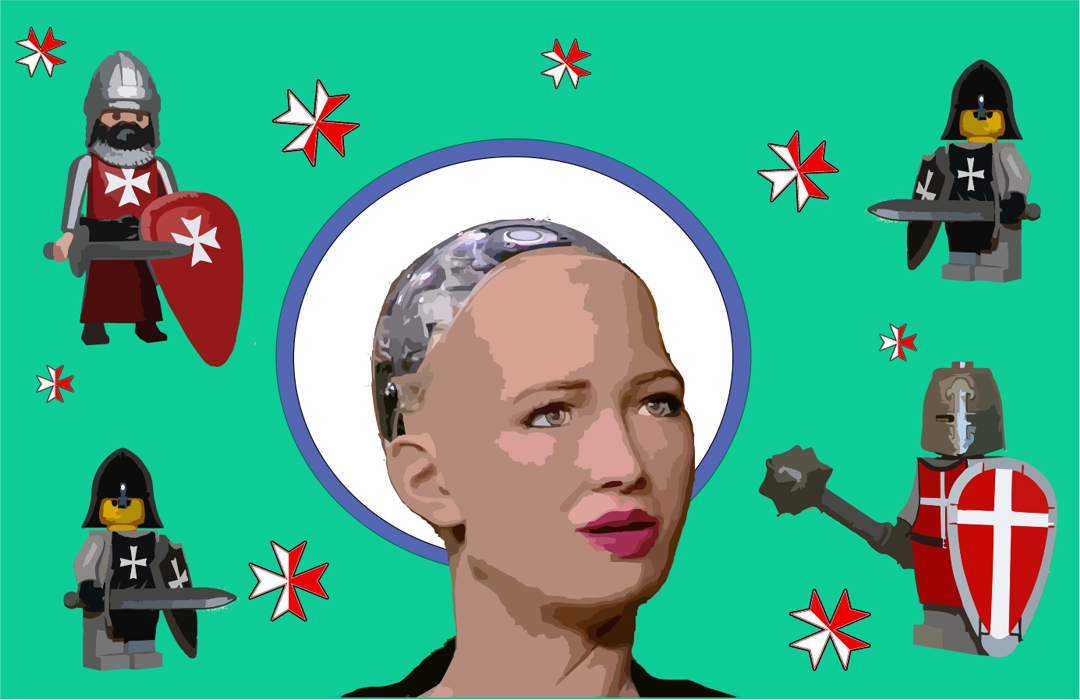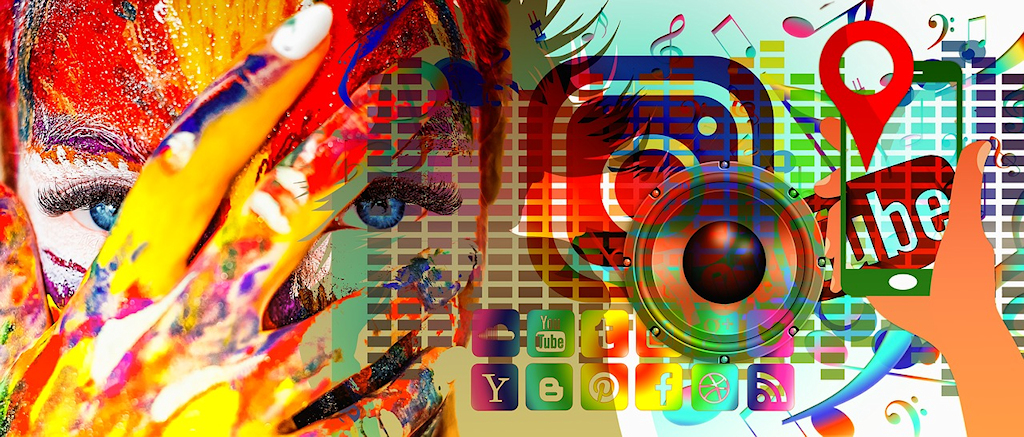
The duty of the state is to ensure that wellbeing of people and the environment are always prioritised before the profits of a handful—and the AI industry should be no exception.
by Daniel Desira
Collage: Isles of the Left
[dropcap]T[/dropcap]he government’s initiative to give Artificial Intelligence (AI) and robotics their due consideration is an ambitious move, since these developments could be potentially beneficial to the contemporary society, while creating a new economic sector. However, the public response to the recent announcement of the prospect of ‘robot citizens’ reveals the lack of understanding of the digital industry’s most fundamental concepts and definitions—a hardly surprising reaction since the Maltese public was not consulted about this new (and bizarre) development and neither were AI and blockchain a topic of any major public debates.
As a #AIEthicsMT open letter to Junior Minister for Financial Services, Digital Economy & Innovation Silvio Schembri underlined, “the Maltese public deserves policy-making that is designed to tackle pertinent problems and that offers sensible, socially-beneficial solutions”. Thus, it is essential to discuss what outcomes Malta’s affair with AI is about to bring to our society.
Artificial Intelligence in a Nutshell
Artificial Intelligence is a broad term. In most cases, AI refers to Narrow Intelligence—a machine’s ability to perform specific tasks and not to human-like cognitive capabilities (or Artificial General Intelligence), which still remains a hope and a dream of futurists and AI engineers.
In its daily use, AI refers to a pool of emerging technologies which allow machines to carry out tasks with a degree of autonomy by mimicking some of human abilities, such as facial and voice recognition. This functionality is achieved through machine learning—a method of training the machine to identify and classify specific objects, such as, for example, cars or numbers. The methodology resembles a process of teaching children by showing multiple different pictures and assigning a category to an image. Narrow AI is incorporated in robotics and is being tested for applications like self-driving cars. It is also responsible for road traffic monitoring in numerous municipalities around the world.
[beautifulquote align=”left” cite=””]Machine-learning methods require a vast quantity of examples upon which machines can be trained. In most cases, these examples come from our online activities.[/beautifulquote]
The machine-learning methods require a vast quantity of examples upon which machines can be trained. In most cases, these examples come from our online activities—content we generate on social networks, platforms like Google or via our interactions with smartphone apps. This volume of information is also dubbed as Big Data. Prior to be used for the purpose of machine learning, raw information is refined—standardized, tagged and categorized—by workers of microwork platforms, located mainly in developing countries, for minimal remuneration.
The digital platforms store and analyse the information on our activities in order to come up with more accurate predictions of our consumer preferences and thus develop web services that are more appealing to customers. Examples include Facebook’s newsfeed ranking system. It decides which posts should feature on our newsfeed depending on the content we shared, users we interacted with in the past, as well as the number and kind of reactions a particular post has received. Events suggestions or advertising on social networks is powered by the same mechanism which analyses our preferences based on our digital footprint.

In this light, blockchain technology that enables peer-to-peer transactions and data sharing could be a game changer. It could allow data sharing to be executed in a more secure, privacy-respecting manner, and while catering for communal needs. On the other hand, depending on the purpose of data collection (especially if administered by corporate players), blockchain might further abet private interests and facilitate harmful and unethical practices such as surveillance of minorities or denying welfare benefits to vulnerable groups.
The Challenges the AI Poses to Our Society
The conversation about the future of the AI technology and Malta’s relationship with it should necessarily be more focused on how it will affect the people on the ground and how these challenges are to be addressed.
To begin with, ethical concerns do not seem to be high on the agenda. Although granting citizenship to robots is clearly a publicity stunt and is not intended to recognise machines as conscious beings, these insinuations are nevertheless outrageous, especially when acquiring citizenship is out of reach for fellow non-EU persons. The discourse should therefore stop referring to machines by ‘he’, ‘she’ or any other pronouns which are normally attributed to humans. Humanising attitudes to robots is misleading since they are not approaching personhood anytime soon.
[beautifulquote align=”left” cite=””]The PR moves deceitfully advertising the advent of conscious machines obscure more immediate challenges posed by Narrow Artificial Intelligence.[/beautifulquote]
Then again, some would argue that these are merely legal technicalities. While this could be true, the PR moves deceitfully advertising the advent of conscious machines obscure more immediate challenges posed by Narrow Artificial Intelligence and deflect our attention from these concerns.
One of such concerns to be discussed is AI’s effect on labour market. Further development in AI will alter the job market in an unprecedented manner since the promise of this technology is to become an efficient cost-saving alternative to human labour. Thus, this technology can potentially bring about mass unemployment, with jobs in legal, service and other industries becoming redundant.
One of the starkest examples of what the advancement of the AI will bring within a few years’ time is Japanese insurance company Fukoku. IBM’s Watson Explorer AI now performs the tasks previously performed by all 34 employees who had been responsible for checking whether invoices submitted by policyholders should be paid out. The employees have been dismissed and the investment will pay for itself almost immediately. The annual salaries for these employees cost 1.1 million dollars. Creating the programme Fukoku incurred a one-off cost of 1.7 million dollars with 170,000 dollars in yearly operating costs.
Thus, AI industry in Malta and beyond should be a subject to rigorous regulations which also must ensure accountability of manufacturers for accidents brought about by errors and bias in their products, especially if the latter could lead to fatal accidents due to their malfunction.
Ways Forward
Considering the role AI already plays in our lives and its near-future effects such as the prospect of mass unemployment, we should be bold in our demands to discuss the possibility of a Universal Basic Income or a Job Guarantee scheme. Another option to consider is a robot tax, which could be a means of maintaining the welfare state and redistributing profits made by the AI technology firms.
The boldest proposal would be to introduce public schemes for data sharing and foster AI technology that benefits communities, is decentralised and democratically owned. DECODE project, pioneered by Barcelona and Amsterdam, is an admirable example to follow: its aim is to provide tools that put individuals in control of their personal data and which allow choosing between keeping it private or sharing it for the public good. Transparent democratic data-sharing and AI projects could open doors to communally-beneficial applications, such as fairer alternatives to AirBnB and Uber.
An astute AI regulation should go hand in hand with reformation of the education system so that it facilitates an in-depth knowledge of STEM subjects, cultivates skills unattainable for machines and nurtures values which prioritise ethics and bring social needs to the fore.
As the climate change is unfolding, AI-driven energy-saving technologies could be of enormous advantage. Tech companies have already achieved impressive results in the field: for instance, Google reduced the amount of energy used for cooling its facilities by up to 40 percent thanks to DeepMind’s machine learning. This technology could be used to benefit society as a whole; further innovation in this field should be encouraged, while making sure that it becomes more affordable for residential blocks.
While carefully designed technological innovation may benefit parts of the population, it might leave others behind. The duty of the state is to ensure that wellbeing of people and the environment are always prioritised before the profits of a handful—and the AI industry should be no exception.

Daniel Desira holds a degree in Software Development. He used to be active in the ICT Student Association’s subcommittee and was later involved in the referendum campaign against spring hunting. Later on, he joined ADZ, the Green youth-wing, where he is currently the Secretary General. He is also a spokesperson on Digital Society for Alternattiva Demokratika. His interests include digital rights, as well as social and climate justice.
